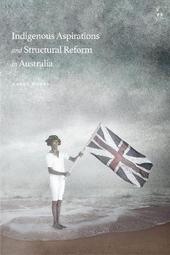
|
Indigenous Aspirations and Structural Reform in Australia
Paperback / softback
Main Details
| Title |
Indigenous Aspirations and Structural Reform in Australia
|
| Authors and Contributors |
By (author) Harry Hobbs
|
| Physical Properties |
| Format:Paperback / softback | | Pages:240 | | Dimensions(mm): Height 234,Width 156 |
|
| ISBN/Barcode |
9781509944040
|
| Classifications | Dewey:342.940872 |
|---|
| Audience | | Professional & Vocational | |
|---|
|
Publishing Details |
| Publisher |
Bloomsbury Publishing PLC
|
| Imprint |
Hart Publishing
|
| Publication Date |
11 August 2022 |
| Publication Country |
United Kingdom
|
Description
Can the Australian state be restructured to empower Aboriginal and Torres Strait Islander peoples and ensure that their distinct voices are heard in the processes of government? This book provides an answer to that question for Australia and provides guidance for all states that claim jurisdiction and authority over the traditional lands of Indigenous peoples. By engaging directly with Indigenous peoples' nuanced and complex aspirations, this book presents a viable model for structural reform. It does so by adopting a distinctive and innovative approach: drawing on Indigenous scholarship globally it presents a coherent and compelling account of Indigenous peoples' political aspirations through the concept of sovereignty. It then articulates those themes into a set of criteria legible to Australia's system of governance. This original perspective produces a culturally informed metric to assess institutional mechanisms and processes designed to empower Indigenous peoples. Reflecting the Uluru Statement from the Heart's call for a First Nations Voice, the book applies the criteria to one specific institutional mechanism - Indigenous representative bodies. It analyses in detail the Aboriginal and Torres Strait Islander Commission and the Swedish Sami Parliament, a representative body for the Indigenous people of Sweden. In examining the Sami Parliament the book draws on a rich source of primary and secondary untranslated Swedish-language sources, resulting in the most comprehensive English language exploration of this unique institution. Highlighting the opportunities and challenges of Indigenous representative bodies, the book concludes by presenting a novel and informed model for structural reform in Australia that meets Indigenous aspirations.
Author Biography
Harry Hobbs is Lecturer at the University of Technology, Sydney.
ReviewsIndigenous Aspirations and Structural Reform in Australia succeeds as an important addition to the literature on reform surrounding Indigenous empowerment ... This book is recommended for scholars, legislative policymakers, academics and students with a keen interest in this area of Indigenous law reform. -- Liew Xuan Ning * University of Tasmania Law Review * This book is an important, excellent contribution to its subject matter, particularly in relation to its own suggestions for law reform ... The text is well structured, measured, and accessible. It treats its subject matter sincerely and respectfully. -- Nadia Stojanova * Law in Context * In this beautiful and well-written book, Dr Harry Hobbs ... tackles an issue that has implications far beyond his stated subject. -- Stephen Young * ASIL Rights of Indigenous Peoples Interest Group Newsletter * This book is a clear, concise, and comprehensive chronicling of options for reforming Australian law and politics related to Indigenous peoples. While this work is theoretically rich I especially appreciated the practical options for positive change which appear in every chapter. * John Borrows, Canada Research Chair in Indigenous Law, University of Victoria * Harry deftly seeks to find solutions to the seemingly intractable tension between Australia's Western-biased constitutional structure and Aboriginal aspirations for self-determination through the inclusion of their voice in Australian governance. It is original, superbly researched and will propel debate forward, which is sorely needed to remedy the illegitimacy of the state-imposed constitutional structure and provide some long-awaited justice for Aboriginal peoples. * Claire Charters, Associate Professor, Auckland Law School *
|